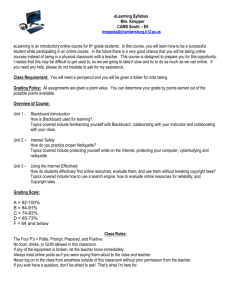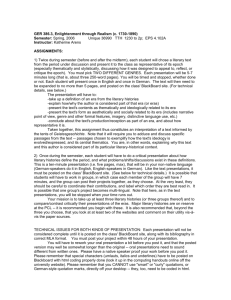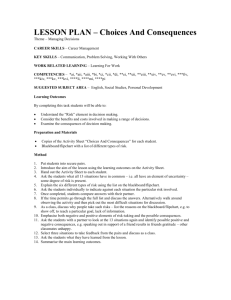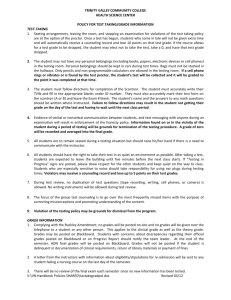Word - University of Southern California
advertisement
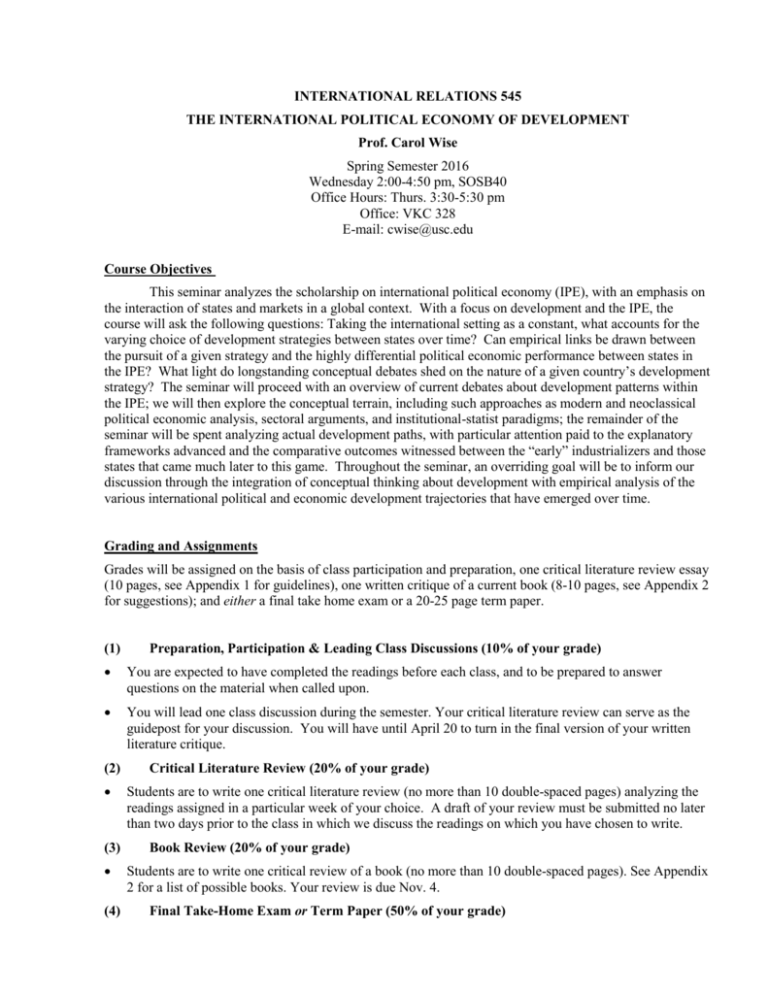
INTERNATIONAL RELATIONS 545 THE INTERNATIONAL POLITICAL ECONOMY OF DEVELOPMENT Prof. Carol Wise Spring Semester 2016 Wednesday 2:00-4:50 pm, SOSB40 Office Hours: Thurs. 3:30-5:30 pm Office: VKC 328 E-mail: cwise@usc.edu Course Objectives This seminar analyzes the scholarship on international political economy (IPE), with an emphasis on the interaction of states and markets in a global context. With a focus on development and the IPE, the course will ask the following questions: Taking the international setting as a constant, what accounts for the varying choice of development strategies between states over time? Can empirical links be drawn between the pursuit of a given strategy and the highly differential political economic performance between states in the IPE? What light do longstanding conceptual debates shed on the nature of a given country’s development strategy? The seminar will proceed with an overview of current debates about development patterns within the IPE; we will then explore the conceptual terrain, including such approaches as modern and neoclassical political economic analysis, sectoral arguments, and institutional-statist paradigms; the remainder of the seminar will be spent analyzing actual development paths, with particular attention paid to the explanatory frameworks advanced and the comparative outcomes witnessed between the “early” industrializers and those states that came much later to this game. Throughout the seminar, an overriding goal will be to inform our discussion through the integration of conceptual thinking about development with empirical analysis of the various international political and economic development trajectories that have emerged over time. Grading and Assignments Grades will be assigned on the basis of class participation and preparation, one critical literature review essay (10 pages, see Appendix 1 for guidelines), one written critique of a current book (8-10 pages, see Appendix 2 for suggestions); and either a final take home exam or a 20-25 page term paper. (1) Preparation, Participation & Leading Class Discussions (10% of your grade) You are expected to have completed the readings before each class, and to be prepared to answer questions on the material when called upon. You will lead one class discussion during the semester. Your critical literature review can serve as the guidepost for your discussion. You will have until April 20 to turn in the final version of your written literature critique. (2) (3) (4) Critical Literature Review (20% of your grade) Students are to write one critical literature review (no more than 10 double-spaced pages) analyzing the readings assigned in a particular week of your choice. A draft of your review must be submitted no later than two days prior to the class in which we discuss the readings on which you have chosen to write. Book Review (20% of your grade) Students are to write one critical review of a book (no more than 10 double-spaced pages). See Appendix 2 for a list of possible books. Your review is due Nov. 4. Final Take-Home Exam or Term Paper (50% of your grade) Disability Disclaimer Students requesting academic accommodations based on disability are required to register with Disability Services and Programs (DSP) each semester. A letter of verification for approved accommodations can be obtained from DSP when adequate documentation is filed. Please be sure the letter is delivered to me as early in the semester as possible. DSP is open Monday-Friday, 8:30-5:00. The office is in Student Union 301 and their phone number is (213) 740-0776. Readings All of the assigned readings have been posted on blackboard and can be downloaded from the USC system under the name and number of this course. The following book is required reading for the course and can be purchased at the USC Bookstore or on Amazon.com: C. Wise, L. Armijo, and S. Katada, eds., How Emerging Economies Survived the 2008-09 Global Financial Crisis (Washington, DC: Brookings Institution, 2015). CLASS SCHEDULE AND READING ASSIGNMENTS Week 1 (Jan. 13): Introduction and Overview of the Course Week 2 (Jan. 20): IPE and Development • P. Collier, The Bottom Billion: Why the Poor Countries are Failing and What Can Be Done about It (New York, NY: Oxford University Press, 2008), pp. 2-52. PDF posted on Blackboard • R. Hausman, D. Rodrik, and A. Velasco, “Growth Diagnostics,” in Narcís Serra and Joseph E. Stiglitz, eds., The Washington Consensus Reconsidered (New York, NY: Oxford University Press, 2008). PDF posted on Blackboard. • W. Easterly, The Elusive Quest for Growth (Cambridge, MA: MIT Press, 2002), pp. 5-85. PDF posted on Blackboard • D. Rodrik, One Economics, Many Recipes: Globalization, Institutions, and Economic Growth (Princeton, NJ: Princeton University Press, 2007), pp. 1-55. PDF posted on Blackboard Week 3 (January 27): The Rise of the Rest • A. Amsden, The Rise of the Rest (New York, NY: Oxford University Press, 2000) pp. 1-28. PDF posted on Blackboard • A. Amsden, “The Wild Ones: Industrial Policies in the Developing World,” in Narcís Serra and Joseph E. Stiglitz, eds., The Washington Consensus Reconsidered. PDF posted on Blackboard • M. Kose and E. Prasad, Emerging Markets: Resilience and Growth amid Global Turmoil (Washington, DC: Brookings Institution Press, 2010), pp. 1-66. PDF posted on Blackboard • A. Szirmai, et al eds., Pathways to Industrialization in the Twenty-First Century (Oxford, UK: Oxford University Press, 2013), pp. 131-267. PDF posted on Blackboard THE CONCEPTUAL TERRAIN Week 4 (Feb. 3): Neoclassical Assumptions & Modern Political Economy • M. Blyth, Austerity: The History of a Dangerous Idea (Oxford, UK: Oxford University Press, 2013), pp. 178-226. PDF posted on Blackboard • A. Kreuger, “Government Failure in Development,” in J. Frieden, M. Pastor, and M. Tomz, eds., Modern Political Economy and Latin America (Boulder, CO: Westview Press, 2000), pp. 10-17. PDF posted on Blackboard • J. Williamson, “A Short History of the Washington Consensus,” in Narcís Serra and Joseph E. Stiglitz, eds., The Washington Consensus Reconsidered. PDF posted on Blackboard. • M. Wolf, Why Globalization Works (New Haven, CT: Yale University Press, 2004), pp. 3-76. PDF posted on Blackboard Week 5 (Feb. 10): Statist Approaches •M. Di Maio, “Industrial Policies in Developing Countries: History and Perspectives, in Mario Cimoni et al, eds., Industrial Policy and Development (New York, NY: Oxford University Press, 2009), pp 107-143. PDF posted on Blackboard • P. Evans, “Predatory, Developmental, and other Apparatuses: A Comparative Political Economy Perspective on the Third World State,” Sociological Forum 4 (1989): 561-587. PDF posted on Blackboard • A. Kohli, State-Directed Development (New York, NY: Cambridge University Press, 2004), pp. 1-26, chapters on Brazil and Korea. PDF posted on Blackboard • D. Rodrik, One Economics, Many Recipes: Globalization, Institutions, and Economic Growth, pp. 99-152. PDF posted on Blackboard Week 6 (Feb. 17): Institutions versus Geography • D. Acemoglu and J. Robinson, Why Nations Fail: The Origins of Power, Prosperity, and Poverty (New York, NY: Crown Business, 2012), pp. 7-123. PDF posted on Blackboard • P. Collier, The Bottom Billion, pp. 53-98. PDF posted on Blackboard •J. Mahoney, The Legacies of Liberalism: Path Dependence and Political Regimes in Central America (Baltimore, MD: Johns Hopkins University Press, 2001), pp. 3-28. PDF posted on Blackboard • D. North, Institutions, Institutional Change, and Economic Performance (New York, NY: Cambridge University Press, 1990), pp. 3-16, 73-104. PDF posted on Blackboard •D. Rodrik, One Economics, Many Recipes: Globalization, Institutions, and Economic Growth, pp. 153-183. PDF posted on Blackboard IPE & DEVELOPMENT IN RETROSPECT Week 7 (Feb. 24): Industrialization & State-Building in Late Developers • D. Acemoglu and J. Robinson, Why Nations Fail, pp. 182-212, 302-334. PDF posted on Blackboard • J. Frieden, “Third World Indebted Industrialization: International Finance and State Capitalism in Mexico, Brazil, Algeria, and South Korea,” International Organization 35 (1981): 407-431. PDF posted on Blackboard • A. Gerschenkron, Economic Backwardness in Historical Perspective (Cambridge, MA: Harvard University Press, 1962), pp. 5-30, 353-364. PDF posted on Blackboard • A. Kohli, State-Directed Development, chapters on Brazil and Korea. PDF posted on Blackboard • S. Kennedy, “The Myth of the Beijing Consensus,” Journal of Contemporary China, 19 (2010): 461-477. PDF posted on Blackboard Week 8 (March 2): Economic Development in (non-industrial) Late Developers • D. Acemoglu and J. Robinson, Why Nations Fail, pp. 124-151, 336-367. PDF posted on Blackboard • D. Acemoglu, S. Johnson, and J. Robinson, “An African Success Story: Botswana,” in D. Rodrik, ed., In Search of Prosperity: Analytical Narratives on Economic Growth (Princeton, NJ: Princeton University Press, 2003), pp. 80-119. PDF posted on Blackboard • T. Karl, The Paradox of Plenty (Berkeley and Los Angeles: University of California Press, 1997), pp. 1-67. PDF posted on Blackboard • A. Kohli, State-Directed Development, chapter on Nigeria. PDF posted on Blackboard • A. Subramanian and D. Roy, “Who Can Explain the Mauritian Miracle? Meade, Romer, Sachs, or Rodrik?” in D. Rodrik, ed., In Search of Prosperity, pp. 205-243. PDF posted on Blackboard • M. Shafer, Winners and Losers: How Sectors Shape the Development Prospects of States (Ithaca, NY: Cornell University Press, 1994), pp. 1–48, chapters on Sri Lanka and Costa Rica. PDF posted on Blackboard Week 9 (March 9): The Tenacity of Poverty and Income Inequality • P. Bardhan, “The Global Economy and the Poor,” in D. Mookerjee, A. Banerjee, and R. Benabou, eds., Understanding Poverty (Oxford, UK: Oxford University Press, 2006), pp. 99-109. PDF posted on Blackboard • A. Case, “The Primacy of Education,” in D. Mookerjee, A. Banerjee, and R. Benabou, eds., Understanding Poverty, pp. 269-284. PDF posted on Blackboard • E. Duflo and A. Banerjee, Poor Economics (New York: Public Affairs, 2011), pp. 235-273. PDF posted on Blackboard • T. Piketty, Capital in the Twenty-First Century (Cambridge, MA: Harvard University Press, 2014), pp.430492. PDF posted on Blackboard • M. Ravallion, “Transfers and Safety Nets in Poor Countries,” in D. Mookerjee, A. Banerjee, and R. Benabou, eds., Understanding Poverty, pp. 203-229. PDF posted on Blackboard • J. Sachs, The End of Poverty (New York, NY: Penguin Books, 2007), pp. 210-265. PDF posted on Blackboard Week 10 (March 16): SPRING BREAK Week 11 (March 23): Development & Aid • A. Alesina and D. Dollar, “Who Gives Foreign Aid and Why? Journal of Economic Growth, vol. 5, no. 1 (2000): 33-63. PDF posted on Blackboard • P. Collier, The Bottom Billion, pp. 99-123. PDF posted on Blackboard • S. Djankov, J. Montalvo, M. Reynol-Querol, “The Curse of Aid,” Journal of Economic Growth, vol. 13, no. 3 (2008): 169-194. PDF posted on Blackboard •W. Easterly, White Man’s Burden (New York, NY: Penguin Books, 2007), pp. 3-59, 165-209. PDF posted on Blackboard .• B. Moyo, Dead Aid: Why Aid is Not Working and How There is a Better Way for Africa (New York, NY: Farrar, Strauss, and Giroux, 2010), pp. 29-97. PDF posted on Blackboard IPE & THE NORTH-SOUTH DIVIDE Week 12 (March 30): BRIC Comparative Analysis • R. Abdelal, “The Profits of Power: Commerce and Realpolitik in Eurasia,” Working Paper 11-028, Harvard Business School, 2011. PDF posted on Blackboard • A. Fishlow, Starting Over: Brazil Since 1985 (Washington, DC: Brookings Institution Press, 2011), pp. 33139. PDF posted on Blackboard • P. Shankar Jha, India and China: The Battle Between soft & Hard Power (New York, NY: Penguin/Viking, 2011), pp. 3-55, 151-196, 273-321. PDF posted on Blackboard • A. Kohli, State-Directed Development, pp. 257-288 (India). PDF posted on Blackboard • S. Neil MacFarlane, “The ‘R’ in BRICs: Is Russia an Emerging Power?” International Affairs, vol. 82, no. 1 (2006): 41-57. PDF posted on Blackboard • B. Naughton, “A Political Economy of China’s Economic Transition,” in L. Brandt and T. Rawski, eds., China’s Great Economic Transformation (New York, NY: Cambridge University Press), pp. 91-135. PDF posted on Blackboard •N. Robinson, “Political Barriers to Economic Development in Russia,” International Journal of Development Issues, vol. 10, no. 1 (2011): 5-19. PDF posted on Blackboard Week 13 (April 6): International Trade in the 21st Century---a Developing Country Standpoint • T. Cohn, “The Doha Round: Problems, Challenges, and Prospects,” in I. Studer and C. Wise, eds., Requiem or Revival: The Promise of North American Integration (Washington, DC: Brookings Institution Press, 2007), pp. 147-165. • M. Khor, “The World Trading System and Development Concerns,” in Narcís Serra and Joseph E. Stiglitz, eds., The Washington Consensus Reconsidered. PDF posted on Blackboard. • R. Lawrence, "Regionalism, Multilateralism, and Deeper Integration," in M. Rodriguez, P. Low, and B. Kotschwar, eds., Trade Rules in the Making (Washington, DC: Brookings Institution, 1999), pp. 23-46. • D. Rodrik, One Economics, Many Recipes: Globalization, Institutions, and Economic Growth, pp. 195-237. • J. Stiglitz and A. Charlton, Fair Trade for All (New York, NY: Oxford University Press, 2005), pp. 107155. Week 14 (April 13): International Finance in the 21st Century---a Developing Country Standpoint •L. Armijo, C. Wise, and S. Katada, “Lessons from the Cases,” in C. Wise, L. Armijo, and S. Katada, eds., How Emerging Economies Survived the 2008-09 Global Financial Crisis (Washington, DC: Brookings Institution, 2015), skim all. •IMF, World Economic Outlook (Washington, DC: IMF, 2003), chapter 2. PDF posted on Blackboard •N. Roubini and S. Mihm, Crisis Economics (London: Allen Lane, 2010), pp. 86-157. PDF posted on Blackboard Week 15 (April 20): Environment •M. Aspinwall, Side Effects: Mexican Governance under NAFTA’s Labor and Environmental Agreements (Palo Alto, CA: Stanford University Press, 2013), pp. . •J. Frieden, D. Lake, and K. Schultz, World Politics: Interests, Interactions, Institutions (New York, NY: W.W. Norton & Company, First Edition, 2010) chapter 12, “The Global Environment.” PDF posted on Blackboard •J. Roumasset, K. Burnett and H. Wang, “Environmental Resources and Economic Growth,” in L. Brandt and T. Rawski, eds. China’s Great Economic Transformation (New York, NY: Cambridge University Press, 2008). PDF posted on Blackboard Week 16 (April 27): Class dinner at my home April 9: TAKE-HOME FINAL EXAM or TERM PAPER DUE BY 5:00 PM Please submit the exam to me by e-mail at: cwise@usc.edu Appendix 1 GUIDELINES FOR WRITING A CRITICAL REVIEW ESSAY 1. Your paper should state and defend your personal judgment of the quality of the body of literature under consideration. How good or bad is it, as a whole? (Note carefully that the assignment is not to evaluate, say, what governments did during the Great Depression. It is to evaluate a body of scholarship on that subject, or a subject like it.) 2. Please do not submit a paper limited to describing what various authors said. I want to see you grappling with their ideas. 3. The maximum length is 3,000 words in size 12 font. Having to edit down to this limit is part of the value of the exercise. 4. At the top of the first page, show your word count and your USC student identification (social security) number. Please do not show your name anywhere on your paper. Recommendations based on experience First study some good published essays reviewing a body of literature (not a single book). International Organization and World Politics, for example, publish these often. As you read your books/articles and consider the following: 1. What do these works have in common? Do all use the same set of concepts and assumptions, or do authors start with fundamentally different concepts? 2. Is the author’s purpose to explain, or is it to interpret? What is the thing to be explained or interpreted, or the dependent variable? 3. What is the central argument of each work? What causal or motivating factors are emphasized? 4. How original or creative is its contribution, does it raise new questions or suggest interesting lines of new investigation? 5. Does this body of literature make any contribution to theory development? If so, in what sense? I recommend dividing your essay into sections: first, evaluate the body of literature as a whole against one dimension, then evaluate it against the second criterion, etc.-- rather than dividing the essay into sections taking up article 1, then article 2, etc. The latter form risks falling into the trap of reporting what other people said rather than defending critical points of your own. Appendix 2 Suggested Books to Review Brautigam, D. 2015. Can Africa Feed China? (New York, NY: Oxford University Press). Deaton, A. 2013. The Great Escape: Health, Wealth and the Origins of Inequality (Princeton, NJ: Princeton University Press). Drennan, M. 2015. Income Inequality: Why It Matters and Why Most Economists Didn’t Notice (New Haven: Yale University Press). Easterly, W. 2014. The Tyranny of Experts: Economists, Dictators, and the Forgotten Rights of the Poor (New York, NY: Basic Books). Ebenstein, Lanny. 2015. Chicagonomics: The Evolution of Chicago Free Market Economics (New York, NY: St. Martin’s Press). Kotz, D. 2015. The Rise and Fall of Neoliberal Capitalism (Cambridge, MA: Harvard University Press). Lardy, N. 2014. Markets over Mao: The Rise of Private Business in China (Washington, DC: Peterson Institute for International Economics). Munk, N. 2013. Jeffrey Sachs and the Quest to End Poverty (New York, NY: Random House). Radelet, S. 2015. The Great Surge: The Ascent of the Developing World (New York, NY: Simon and Schuster). Rodrik, D. 2015. Economics Rules: The Rights and Wrongs of the Dismal Science (New York, NY: W.W. Norton). Ross, M. 2013. The Oil Curse: How Petroleum Wealth Shapes the Development of Nations (Princeton, NJ: Princeton University Press).

